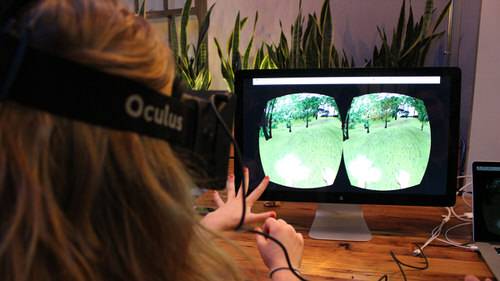In the coming years, one billion more people will gain access to the Internet thanks to drones and satellites hovering in the stratosphere.
And soon, we’ll be able to sit down with friends in foreign countries and immerse ourselves in experiences never previously thought possible, simply by slipping on a pair of virtual reality goggles.
These aren’t just gaseous hypotheticals touted by Silicon Valley startups, but efforts led by one company, whose mission is to make the world more open and connected. If one company actually pulled off all of these accomplishments, it might seem like people would fall in love with it—but once you know it’s Facebook, you might feel differently. And you’re not alone.

Facebook has a perception problem, which is largely driven by the fact it controls huge amounts of data and uses people as fodder for advertising. Facebook has been embroiled in numerous privacy controversies over the years, and was built from the ground up by a kid who basically double-crossed his Harvard colleagues to pull it off in the first place.
These days, Facebook appears to be growing up by taking billion-dollar bets on future technology hits like WhatsApp and Oculus in order to expedite its own puberty.
Its billion-dollar moves in recent weeks point to a new Facebook, one that takes risks investing in technologies that have not yet borne fruit, but could easily be the “next big thing” in tech. One such investment, the $2 billion acquisition of Oculus, left many people scratching their heads as to why a social network would pick up a technology that arguably makes people less social, since Oculus is all about immersive gaming. At least the WhatsApp purchase makes a little more sense strategy-wise, even if the $19 billion deal was bad for users.
So begins Facebook’s transition from a simple social network to a full-fledged technology company that rivals Google, moonshot for moonshot.
Companies need to keep things fresh in order to make us want them, but Facebook, like Barney Stintson from How I Met Your Mother, just can’t shake its ultimately flawed nature and gain the trust of consumers.
The Ultimate Data Hoard
If you think you’re in control of your personal information, think again.
Perhaps the largest driver of skepticism towards Facebook is the level of control it gives users—which is arguably limited. Sure, you can edit your profile so other people can’t see your personal information, but Facebook can, and it uses your data to serve advertisers.
Keep in mind: This is information you provided just once in the last 10 years—for instance, when you first registered your account and offered up your favorite movies, TV shows and books—is now given tangentially to advertisers or companies wanting a piece of your pocketbook.
Not even your Likes can control what you see in your news feed anymore. Page updates from brands, celebrities, or small businesses that you subscribed to with a “Like” are omitted from your News Feed when page owners refuse to pay. Your Like was once good enough to keep an update on your News Feed, but now the company is cutting the flow of traffic and limiting status views by updating its algorithms—a move many people think is unfair, if not shiesty.
See also: 3 Ways The Facebook-Oculus Deal Could Work Out, From Awesome To Terrifying
It’s not just Page posts taking a hit, audience-wise—even your own posts could be seen by fewer people if Facebook deems them “low-quality.”
To help eliminate links it doesn’t consider “news” like Upworthy or ViralNova, Facebook tweaked its algorithm to show fewer low-quality posts in favor of more newsworthy material, like stories from The New York Times. Of course, most people appreciate this move since click-bait links can get truly annoying, but it’s concerning that Facebook has so much control over the firehose of information you put in front of your eyes every single day.
Facebook owns virtually all the aspects of the social experience—photos (Instagram), status updates (Facebook), location services (Places)—but it has also become your social identity thanks to Facebook Login, which allows it to integrate with almost everything else on the Internet. This means if you’re not spending time on Facebook, you’re using Facebook to spend time online elsewhere.
It’s this corporate control of traffic that leads to frustration from those that believe Facebook owns too much, and that working with Facebook is like smacking the indie community hard across the face.
In a sense, people are stuck. They initially trusted a company with their data and information, and in return, those people feel—often justifiably—that they’re being taken advantage of. When the time comes for someone to abandon Facebook, whether over privacy concerns or frustration with the company, Facebook intentionally makes it hard to leave.
Even if you delete your account, your ghost remains. Your email address is still tied to a Facebook account and your face is still recognizably tagged as you, even if the account it’s associated with has vanished. In this way, Facebook is almost like any other cable company—even when you die, Facebook can still make money off you. And that’s not behavior fit for a company that’s poised to take over the future.
Leveling Up

Facebook missed the boat on mobile, and its much-maligned Android application interface Facebook Home was a major failure. Though Home was a small step into hardware, it was one users clearly didn’t want.
Now Facebook is dreaming bigger. With recent acquisitions like Oculus and talks with drone maker Titan Aerospace, the company is looking to expand outside of its social shell and be taken seriously as a technology company and moonshot manufacturer.
Facebook’s well-known slogan “move fast and break things” is regularly applied to new products and features—undoubtedly a large part of Home’s initial failure. The company is ready to try again, this time with technologies and applications that consumers aren’t yet familiar with. But this has created more questions than answers in the eyes of users and investors. And that’s not good for a company with an existing perception problem like Facebook.
People see Facebook moving fast and breaking things to serve its own purposes, not for the benefit of the Internet, or in the case of Oculus, the benefit of dedicated fans.
Facebook isn’t leaving the social realm, at least not yet. It’s still relying on the flagship website to power its larger plans, particularly Internet.org, which aims to bring the next billion people online.
Facebook CEO Mark Zuckerberg wants a Facebook that connects the world, becoming a convenient way for people to find one another, and a gateway for Internet connectivity in developing countries.
Zuckerberg announced last week how he plans to bring the Internet.org initiative into fruition—and it sounds like a plan straight out of a sci-fi novel. The company is putting drones to work, powering the Internet in communities that don’t yet have it, which is being accompanied by other technologies like lasers and satellites to distribute the connectivity in largely-populated areas.
When Zuckerberg first announced Internet.org, he initially threw shade at Google’s similar Project Loon, which attempts to connect the world via Wi-Fi balloons.
“Drones have more endurance than balloons while also being able to have their location precisely controlled,” he wrote in a white paper explaining the project. Of course regardless of the method, with more people online, Facebook will control more data and information, and have a larger pool of people to use for advertising.
To gain more users—and keep the ones it has—Facebook needs to change. But when Facebook’s CEO starts talking about drones and lasers powering the Internet, despite the company’s history of reckless privacy policies, it immediately sets off red flags for users.
Facebook Is Growing Up
Last October, when Facebook finally admitted teenagers were abandoning the network for other hot services like Snapchat and Tumblr, the Internet heaved a collective, “Told you so!”
But teens aren’t the future for Facebook. Zuckerberg’s company has ambitions that go beyond selfies. It can’t remain the same forever, especially if it wants to stay relevant in the ever-changing technological landscape.
Facebook wants to build the Internet’s future infrastructure. It wants to be a part of the technology of that power the next billion people’s online experiences ten more years down the road. Zuckerberg has personally tried to bolster his raw perception with his $1 salary—a symbolic gesture, sure, but nothing Steve Jobs or Bill Gates hadn’t done before.
To build and control the future it wants, it will have to “be more cool” and ease up on its control of users. Facebook has many exciting projects, but it won’t have an audience left unless it addresses its perception problem. Trust is paramount, especially on the Internet, and people need to know that Facebook is making things to improve the human experience, not just spending billions to make even more billions off our personal information.
Facebook has a great opportunity to improve its image with its exciting multi-billion dollar acquisitions. Prove to us you don’t just care about money, Facebook, and perhaps we’ll all realize how much you really have grown in the last 10 years.
Lead image by Madeleine Weiss for ReadWrite; Oculus Rift photo by Adriana Lee for ReadWrite; drone photo courtesy of Titan Aerospace
















